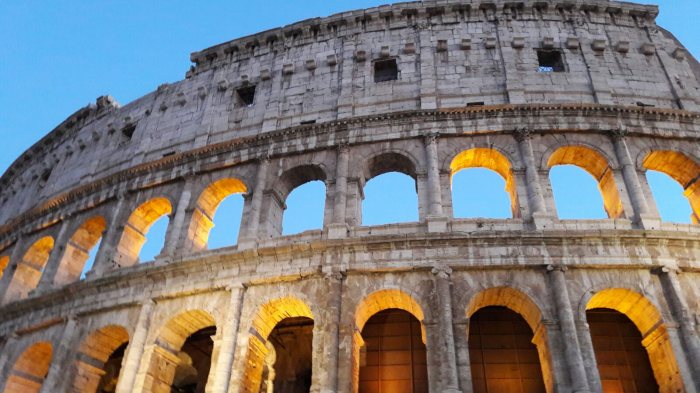Writers are often asked about their inspiration. The word comes from Latin verb to breathe in. Often we think of it as a moment in which something extraordinary is breathed into us. We say ‘I was inspired by the sunset’ or ‘I was inspired by her words…’ One of my main inspirations is Italy. Not a moment, more a lifetime’s breathing-in of all that is wonderful about the country and its people.
My deep, almost visceral, love for Italy began when I was ten years old. My father had taken my older brother and me camping in the Alps in a VW van. It was not a relaxing holiday as my father was an eccentric and frugal man, so we usually parked up in a field in a remote area with no facilities. It was the summer, but nights at altitude were freezing cold and I always woke up shivering and longing for the comfort of home and my mother’s warm hugs. Then, one day my father looked at the map and saw that we were close to the border with Italy.
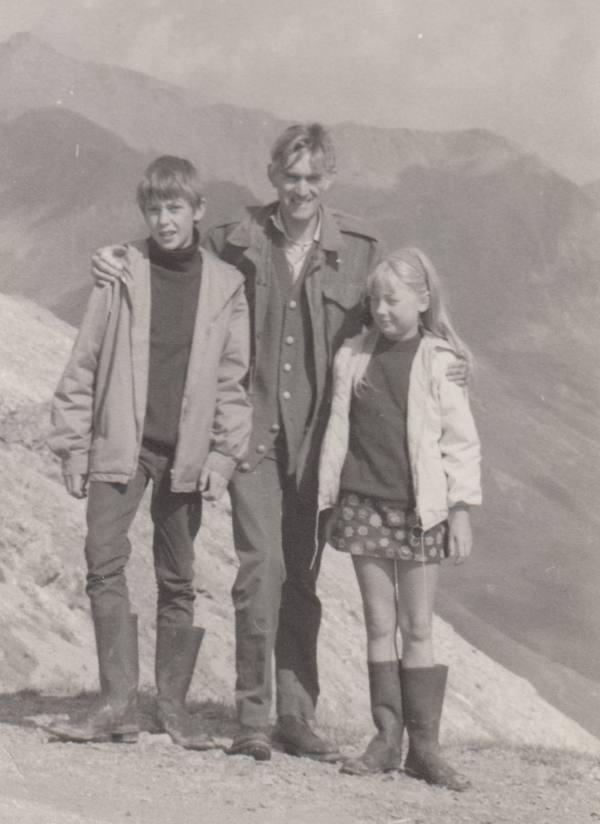 Me at ten years old on a camping trip in the Alps with my father and brother, just before visiting Italy for the first time.
Me at ten years old on a camping trip in the Alps with my father and brother, just before visiting Italy for the first time.
From the moment we started descending into the valleys below the Bernina pass, the air seemed to be more clement, the colours softer, the people more welcoming. We had been existing on tins of beans or tomato soup heated on a calor-gas ring. My father would not countenance the idea of eating a nutritious lunch in a trattoria, but he had a very sweet tooth and, weirdly, we were allowed any amount of unbelievably delicious ice cream and those little cakes that Italians take wrapped in pretty parcels to their families on Sunday. I can still remember my first lick of nocciola (hazelnut) ice cream and my first taste of alcohol was marsala in the zabaglione cream within a tiny choux bun.
I had long, naturally blonde hair. Shopkeepers smiled at me and called me ‘Bionda, bella!’ I felt warm and happy in the sunshine. Italy instantly became my favourite country in the world, favourite things being very important when you are ten.
We travelled as far as Verona where a huge, almost pristine Roman amphitheatre stands in the town centre, still part of the fabric of the town and used for concerts and opera.
When reading novels, or visiting Stratford-upon-Avon I had imagined myself back into Victorian or Tudor times, but this was the first time I found myself stepping in the footsteps of real people who had lived two thousand years before. It was mind-blowing.
When we returned from that holiday, I started at grammar school in the local town. As I had attended a tiny village primary school, I arrived knowing nobody and not very much about anything. Unlike some of the other girls, I had never studied history, but I was delighted by our first topic, the Romans. For our first homework the teacher set us the task of writing a poem about the founding of Rome. I stayed up most of that night composing an epic whose first lines I can still remember:
Romulus and Remus whose song is here sung,
Lost both their parents when very young.
Their uncle the Regent said ‘I can see…
These boys will be a threat to me!’
So, into a basket of reed, he put them
And with all speed
Sent them floating down the stream…
The babies cried and would have died
But a she-wolf came beside
With motherly care she took them home
And with her cubs reared them as her own…’
The poem went on in simple rhyming couplets for pages and pages about the wolf rearing the twins, the shepherd adopting them, the brothers’ rivalry, Remus’s murder, Romulus founding Rome. It ended with the lines:
‘The Gods on Romulus must have had pity,
For they saved his young life and protected his city.’
Despite the corny rhymes, I got an A. Suddenly, the little girl no one knew was somebody to be reckoned with. History immediately became my favourite subject.
Even better, we started learning Latin. People call it a dead language but for me it was very much living because it was the language the Romans had spoken to each other. I’d never learned a foreign language before, and I was quite shy about speaking, but I loved puzzling out meaning through vocabulary and logic, especially Virgil’s extraordinarily beautiful poem about the founding of Rome, the Aeneid.
Eventually my passion for these two subjects led me to gaining a place at Oxford to study Classics, but before I went to uni, I was desperate to escape my childhood home for a year abroad. The city I was going to was never in doubt.
I applied for a job as an au pair, and, with a ludicrously large suitcase, caught the train from Victoria, destination Rome. The only bit of the journey I can remember now is waking up after a chilly night crossing the Alps, looking out of the window as the train trundled along the Italian coast, seeing sunshine, palm trees and blue sea out of one side of the train, and warm yellow-ochre and terracotta villages on the other.
The family I was working for were titled aristocrats originally from Florence. I was seventeen. The three girls who were my charges were ten, twelve and fifteen. I was their thirty-first ‘signorina’. The walls of the large apartment were covered in silk and displayed paintings of their ancestors by Renaissance artists. When we once visited the family palazzo in Florence, there was a genuine Botticelli on the wall.
Au-pair-dom is a peculiar status – not family, yet not quite a servant. I had to work long hours doing all the girls’ washing, ironing and homework, but at meal times, I sat with the family and was served from silver platters by the cook. I was responsible for cleaning the girls’ bedrooms and bathroom, but a housekeeper attended to the parents’ needs. If I ever tried to exchange a sympathetic glance with her as we toiled, she was having none of it. She had been with the family all her life and her loyalty was absolute.
When working, I was forbidden to speak Italian. The whole reason for having me there was so the girls would become fluent in English as befitted young ladies of their class. I had only one day off a week and a couple of hours each weekday morning while the girls were at school. I didn’t know anyone in Rome, so I spent these precious times with other English au pairs I’d met when taking my girls for play dates. My original intention to learn Italian didn’t really happen, but I learned valuable life lessons, such as always to drink coffee at the bar rather than a table because it’s cheaper; never to smile at random men trying to chat you up; never to pay even half the price of anything you’re offered from a market stall.
As I lived a tram ride from the city centre, there wasn’t enough time to visit the sites, or museums during my mornings, but there were compensations for living with such a powerful family. Once the mother realised I was interested in culture, she arranged for us to have a private view of the Sistine Chapel. Sharing that vast, echoing space with half a dozen people instead of thousands; marvelling at the brightness of iconic paintings so widely reproduced you cannot believe you are seeing the originals, imagining Michelangelo himself perched high up on scaffolding creating heavenly beauty that looks perfect when viewed from the ground, was a miraculous experience.
When I turned eighteen, I plucked up the courage to ask for evenings off once the girls were in bed. I took the bus to the Piazza Barberini where there was a club where ex-pat TEFL teachers and au pairs exchanged conversation with Italians. Often men I’d met would ring to ask me out, but when my employer picked up the phone, she would allow me to speak only to people she considered suitable, judging this solely on whether their accent came from north of Rome. Through this process of elimination, I found myself being wined, dined and driven round Rome in an open-topped red sports car by a very charming man of Venetian origin who was at least twice my age, probably married and not in fact very suitable at all. I was still young and full of dreams, but Rome was where I learned to look after myself. Rome was where I started to become the person I am today.
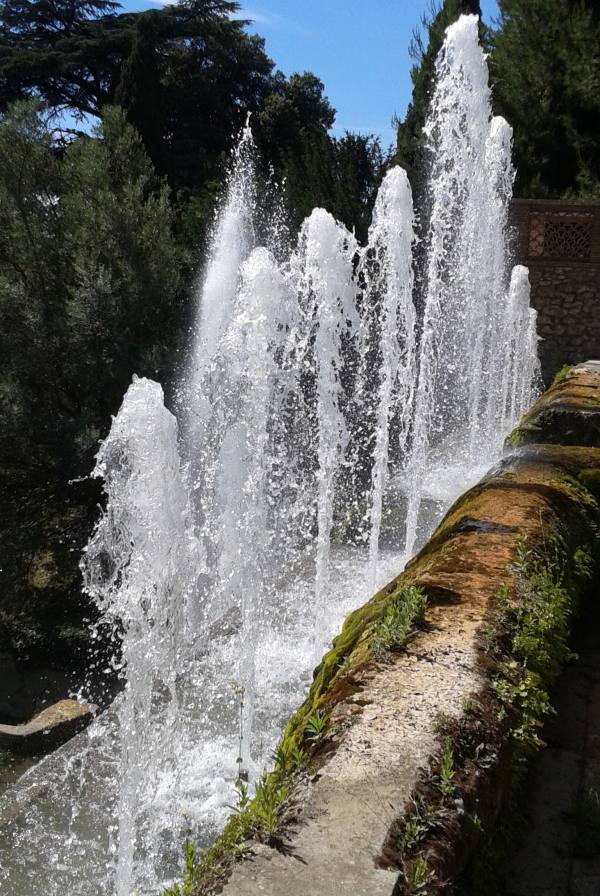 Villa D’Este Tivoli
Villa D’Este Tivoli
On our days off, a couple of the other au pairs and I would usually try to get out of the city. This is how I first discovered the Villa D’Este in Tivoli, an hour away from Rome by bus, and for me one of the most peaceful, beautiful places in the world. In my imagination, I dreamed of romantic encounters in such places. In reality, that never happened until I wrote Only You, and pictured my two main characters Letty and Alf there realising that they are falling in love.
I went back to Italy many times over the years, getting to know other gorgeous places – Tuscany, Venice, the Bay of Naples, Sicily. My novel Miss You was partly inspired by visits to Florence. When it was published and became an international bestseller, I was able to afford to live abroad for a while. The city I chose was Rome.
I had half an idea for a love story – an image of two people dancing in the Piazza Navona – but I needed to find out who they were and why they were both in Rome.
After forty years, the city seemed almost exactly as I remembered, which was probably not surprising given that a lot of it has been there for millennia not decades. If anything, it seemed more golden than my memories.
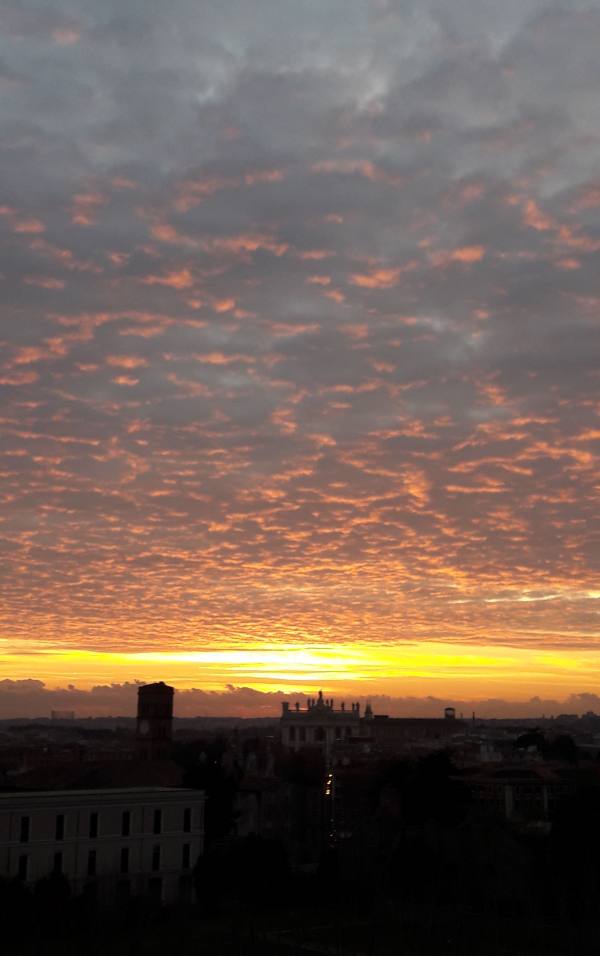 Sunset from the window of my apartment
Sunset from the window of my apartment
I rented a loft apartment in a residential area a mile or so from the centre with a breath-taking view of the city. For the five winter months I lived there, the weather was particularly beautiful, the skies unbelievably blue, the air crisp and filled with sunshine. Almost every evening, I watched a spectacular sunset.
Determined to learn Italian this time, I enrolled in a school. My walk there each morning took me over a busy roundabout where many tram routes criss-cross beneath the arches of the Porta Maggiore, built by the Emperor Claudius in 52 AD. Then, under a railway bridge and along the Aurelian Walls which skirt the night-club area of San Lorenzo. It’s this juxtaposition of ancient and modern that makes Rome unique and, for me, constantly exhilarating.
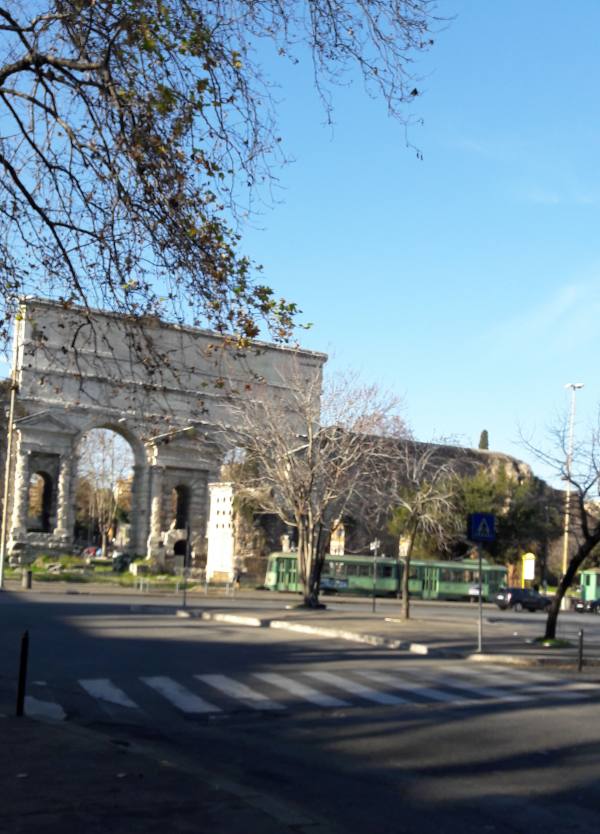 Porta Maggiore with tram
Porta Maggiore with tram
The students in the school came from all over the world and mostly stayed for only a few weeks. Speaking low-level Italian, we were unable to say a lot of things we wanted to, so I learned not to make the judgements I would normally do on meeting people, and I found that the slow discovery of people’s stories and their various reasons for being in Rome gave me the starting point for ONLY YOU.
Although I was still shy about speaking a foreign language, I found the same delight in finding meaning in text from careful analysis of vocabulary and grammar as I had when I was ten years old.
Lessons took up each morning. In the afternoons I had the time to visit places like the Forum which I had only been able to rush around in my teens. I visited museums such as the Villa Giulia, a beautiful palace with painted ceilings which houses a wonderful collection of Etruscan artefacts. I did not need to return to the Vatican, my memory of my first visit there still so perfect.
 Gelato
Gelato
Now I had enough money to sit at a table inside the gelateria Giolitti if I wanted, to be served ice cream in a cup by a waiter, rather than queuing for a cone. At weekends, I revisited Tivoli and many of the other beautiful towns within an hour of Rome, like Tarquinia, Ostia and Anzio.
I learned about places that I had never previously visited in Rome such as the Giardini degli Aranci, a park on the Aventine with orange trees that has a wonderful view, and the Gianiculo Hill that rises above Trastevere, which is the best place to view the sunset as the angle of the light somehow turns the yellow-gold stone of the city to rose.
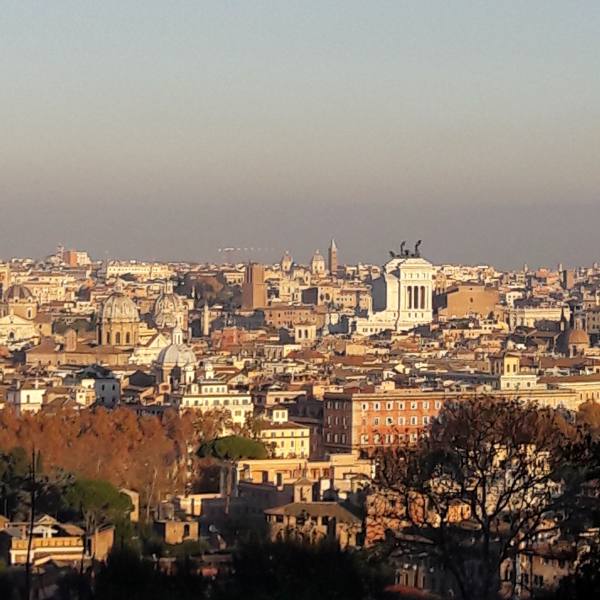 Rome from the Gianiculo Hill
Rome from the Gianiculo Hill
I loved living in a proper neighbourhood with a library and little shops. Large supermarkets are still uncommon in Italian cities, as are the ubiquitous chain stores we are used to. I believe Rome’s first Starbucks opened in 2020. Mostly people have a favourite local bar where they drink several coffees during the day.
I found a local restaurant where the lunchtime menu was so delicious, and so reasonable, it was ridiculous to even think about cooking for myself. It might seem a little boring to return to the same place again and again, but this is not at all unusual in Italy, and indeed it can cause offence if for some reason you miss a few days once the proprietor knows you.
Not everything was rosy. With prostitutes waiting for commuters to pick them up on the street below my apartment, and a cardboard encampment of homeless people opposite, life in Rome is tough for many people. I was constantly in awe of how most Italians accepted with equanimity the huge numbers of refugees landing in their country while the rest of Europe turned its back.
As summer approached, my beautiful apartment with its wall of window, but no air conditioning, became unbearably hot, and there were pressing reasons for me to return to England. On my last night in Rome, I felt so sad that this wonderful adventure was coming to an end, I caught the bus into town to throw a coin in the Trevi Fountain to make sure that I returned!
Every writer has a different way of working on a novel. I generally spend months thinking about my characters and the themes I want to write about. I know the direction in which the book will head, but when I eventually sit down at the computer to write, I do not know what I am going to write about or what is going to happen. The only thing I do know is which character’s point of view I am in and where they are. Location is therefore incredibly important to me, and it is also what makes writing enjoyable for me, thinking myself back to a place, seeing the colours, hearing the ambient noises, smelling the aromas, tasting the food.
I didn’t start writing Only You until months after I returned to England after my glorious sojourn in Rome, but once I did, I felt I was returning to the city I love, and I very much hope that my readers will be transported there too.

